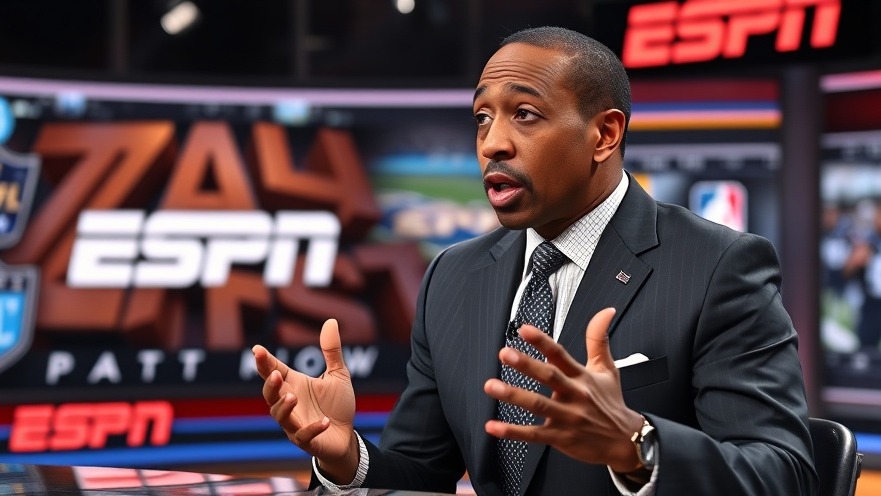
The Fallout from an Uncivil Gesture in NFL
The latest episode of First Take, featuring famous sportscasters Ryan Clark, Stephen A. Smith, and Cam Newton, discussed a recent dramatic incident involving NFL player Brian Branch of the Detroit Lions. The tension unfolded after a game last weekend, where the Kansas City Chiefs triumphed over the Lions 30 to 17. Although the game garnered attention for its outcome, it was an off-field skirmish that has now eclipsed the scoreboard.
The video 'Stephen A. Smith calls for Brian Branch to be ‘SUSPENDED IMMEDIATELY’ | First Take' presents a compelling discussion on player conduct in the NFL, inspiring an analysis of the issues surrounding sportsmanship and accountability.
At the end of this intense match, patience ran thin when Branch ignored a congratulatory high-five from Patrick Mahomes. This refusal escalated, culminating in a physical brawl with Juju Smith-Schuster, leading Smith to strongly advocate for Branch's immediate suspension on the national platform. "How should the league handle this? Well, first of all, he should be suspended immediately," Smith asserted.
The Nature of Sportsmanship and Aggression
Branch’s actions have ignited a heated debate about professionalism and aggression in sports. What was meant to be a competitive game turned into a detrimental showcase of poor sportsmanship. Clark and Newton pointed out that every player experiences high emotions during games, but momentary frustrations should never result in unprofessional behavior, especially after the final whistle has blown.
Branch’s decision to retaliate against Smith-Schuster after the game raises fundamental questions about emotional intelligence in the face of competition. Was he letting his frustrations override his better judgment? The tension was brewing all night and exploded in a way that could potentially jeopardize Branch’s career and harm his team.
Consequences that Matter in Professional Sports
There’s no denying that Branch's history may come into play regarding the penalties he faces. The NFL is known for its stringent regulations across the board, including reviewing past infractions when determining penalties in current incidents. Notably, Branch has been fined a cumulative $130,000 for 13 infractions ranging from low blocks to unsportsmanlike behavior. With this background, it’s safe to say that his recent actions could lead to a harsher punishment than someone with a clean slate.
As emphasized by Smith, the fallout of this incident extends beyond one player: "Now you're putting your team in jeopardy," he stated. The implications spread throughout the organization and affect how the team is perceived nationally.
Examining Emotional Awareness in High-Pressure Environments
Branch’s situation serves as a crucial reminder to all athletes about the need for emotional restraint. With the spotlight on them, players must recognize that their on-field reactions can have off-field consequences. As Cam Newton articulated, "You shouldn't go and have this type of act to now be the clip that describes Brian Branch."
This situation serves a dual purpose: it’s an excellent example of where we can improve in managing emotions during high-stakes games, and it reassures fans that those involved are held accountable. If emotions run high during the game, players have to remember to maintain their composure afterward.
The Bigger Picture in NFL Governance
Stephen A. Smith made a compelling point by stating that the NFL has to review not only the event but also consider the escalation's implications. If players like Mahomes, who is known for his sportsmanship, become entangled in brawls, the entire league's image could be at stake. The integrity of the game relies on sporty conduct both during and after matches.
Should a suspension be levied against Branch, it would undoubtedly serve as notice to others about the consequences that can occur from choosing aggression over professionalism. Smith concludes, "the league needs to make an example out of this because there’s more at stake than just one game."
This incident has offered a prime opportunity to reevaluate player conduct, both because of the immediate repercussions of poor decisions and the ongoing cultural shift toward healthier sportsmanship. As the NFL examines its rules and consequences for unsportsmanlike behavior, the focus will be on maintaining the integrity of the game far beyond individual performance.
Branch's actions, albeit one stark incident, can catalyze deeper discussions about behavior expectations from players in the NFL. How athletes approach their rivals post-game and handle intrateam interactions can shape narratives around leagues moving forward.
The Role of Fans and Society in Guiding Positive Conduct
Athletes are viewed as role models by countless fans and aspiring players. Their conduct under pressure not only defines their careers but also influences the future behavior of generations coming into the sport. The steps taken by both league officials and the Detroit Lions in response to Branch's conduct will set the standard for newcomer expectations.
The call for emotional awareness emphasizes a vital lesson: sports aren't merely a business or a continuous display of physicality but an opportunity to teach accountability and good sportsmanship.
In examining this event, fans are invited to reflect on the respect expected in sports and advocate for a culture that values professionalism.
 Add Element
Add Element  Add Row
Add Row 



Write A Comment